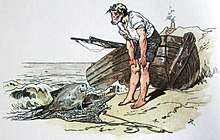Anti-fairy tale

An anti-fairy tale, also called anti-tale, is a fairy tale which, unlike an ordinary one, has a tragic, rather than a happy ending, with the antagonists winning and the protagonists losing at the end of the story. Whereas fairy tales paint a magical, utopian world, anti-fairy tales paint a dark world of nastiness and cruelty. Such stories incorporate horror, black comedy, mean-spirited practical jokes on innocent characters, sudden and often cruel plot twists, and biting satire.[1][2] The term (German: 'Antimärchen') was introduced by Andrè Jolles[1] in his Einfache Formen (1930).[3]
Examples of anti-fairy tales include "The Fisherman and His Wife" and "The Swineherd".[1] The term is also used to refer to remakes of traditional "happy" fairy tales into "unhappy" ones.[2] The Shrek film series, which parodies and satirises fairy tales, includes several elements of anti-fairy tales such as the deaths of heroic characters and scatalogical humour.
See also
References
- 1 2 3 The Greenwood Encyclopedia of Folktales and Fairy Tales: A-F, article "Anti-fairy tale", p. 50
- 1 2 Catriona McAra, David Calvin, Anti-Tales: The Uses of Disenchantment, Cambridge Scholars Publishing, May 25, 2011, ISBN 1443830550, p. 4
- ↑ André Jolles: Einfache Formen. Legende, Sage, Mythe, Rätsel, Spruch, Kasus, Memorabile, Märchen, Witz. Niemeyer, Halle (Saale) 1930 (Forschungsinstitut für Neuere Philologie Leipzig: Neugermanistische Abteilung; 2) p. 242.
Further reading
- Lutz Röhrich, Märchen mit schlechtem Ausgang" ("Fairy Tales with Bad Ending"), In: Hessische Blätterfür Volkskunde. 49-50 (1958) 236-248